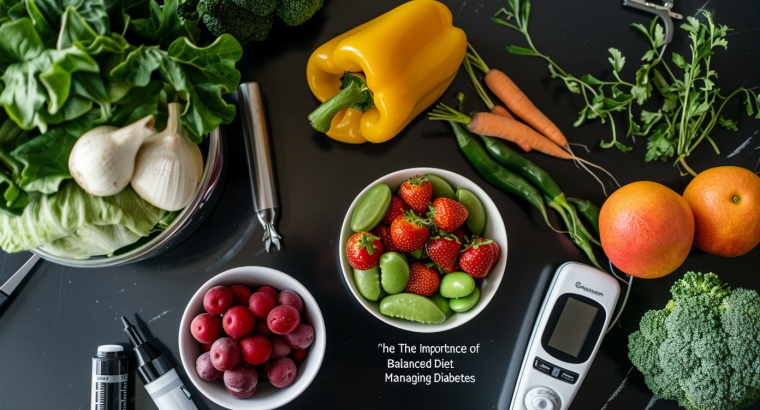The Importance of a Balanced Diet for Managing Diabetes
Managing diabetes effectively requires a multifaceted approach, but one of the most critical components is maintaining a balanced diet. Understanding the importance of a balanced diet in diabetes management can significantly improve your quality of life and help you maintain optimal health. This blog post will delve into the reasons why a balanced diet is essential for those with diabetes and provide practical tips to implement healthy eating habits.
Understanding Diabetes
Diabetes is a chronic condition characterized by high levels of blood glucose (sugar). It occurs when the body either does not produce enough insulin (Type 1 diabetes) or cannot effectively use the insulin it produces (Type 2 diabetes). Proper management of diabetes involves monitoring blood sugar levels, taking medications as prescribed, engaging in regular physical activity, and most importantly, adhering to a balanced diet.
The Role of a Balanced Diet in Diabetes Management
A balanced diet is crucial for managing diabetes for several reasons:
- Blood Sugar Control:
- Consuming a balanced diet helps regulate blood glucose levels. Foods that are high in fiber, low in simple sugars, and rich in nutrients can prevent blood sugar spikes and crashes.
- Weight Management:
- Maintaining a healthy weight is vital for managing diabetes. A balanced diet that includes appropriate portions and healthy food choices can help achieve and maintain a healthy weight.
- Nutrient Intake:
- A balanced diet ensures that you get all the essential nutrients your body needs to function correctly. This includes vitamins, minerals, fiber, and healthy fats that are crucial for overall health.
- Heart Health:
- People with diabetes are at a higher risk of developing cardiovascular diseases. A balanced diet low in saturated fats, trans fats, and cholesterol can promote heart health.
- Improved Energy Levels:
- Eating a variety of foods in balanced portions provides consistent energy throughout the day, helping you stay active and focused.
Components of a Balanced Diet for Diabetics
To create a balanced diet that supports diabetes management, consider the following components:
- Carbohydrates:
- Focus on complex carbohydrates such as whole grains, legumes, and vegetables. These foods have a lower glycemic index, which means they have a slower, less pronounced effect on blood sugar levels.
- Proteins:
- Include lean protein sources like poultry, fish, beans, and tofu. Protein helps maintain muscle mass and can aid in blood sugar control.
- Fats:
- Choose healthy fats from sources like avocados, nuts, seeds, and olive oil. Avoid trans fats and limit saturated fats to support heart health.
- Fiber:
- Aim for high-fiber foods such as fruits, vegetables, whole grains, and legumes. Fiber slows down the absorption of sugar and helps control blood sugar levels.
- Vitamins and Minerals:
- Ensure your diet includes a variety of fruits and vegetables to meet your vitamin and mineral needs. This supports overall health and helps prevent deficiencies.
Practical Tips for a Balanced Diet
Here are some practical tips to help you maintain a balanced diet for managing diabetes:
- Plan Your Meals:
- Plan your meals and snacks ahead of time to ensure they are balanced and nutritious. This helps avoid impulsive, unhealthy food choices.
- Portion Control:
- Use smaller plates and bowls to help control portion sizes. Eating smaller, more frequent meals can also help manage blood sugar levels.
- Read Food Labels:
- Learn to read food labels to make informed choices about the foods you eat. Pay attention to serving sizes, carbohydrate content, and added sugars.
- Stay Hydrated:
- Drink plenty of water throughout the day. Avoid sugary drinks that can cause blood sugar spikes.
- Limit Processed Foods:
- Reduce your intake of processed and packaged foods. These often contain unhealthy fats, added sugars, and high levels of sodium.
- Seek Professional Guidance:
- Work with a registered dietitian or nutritionist who specializes in diabetes management. They can help create a personalized eating plan that meets your needs.
Conclusion
A balanced diet is a cornerstone of effective diabetes management. By focusing on nutrient-dense foods, controlling portions, and making informed food choices, you can better manage your blood sugar levels, maintain a healthy weight, and reduce the risk of complications associated with diabetes. Remember, small changes in your diet can lead to significant improvements in your overall health and well-being.

